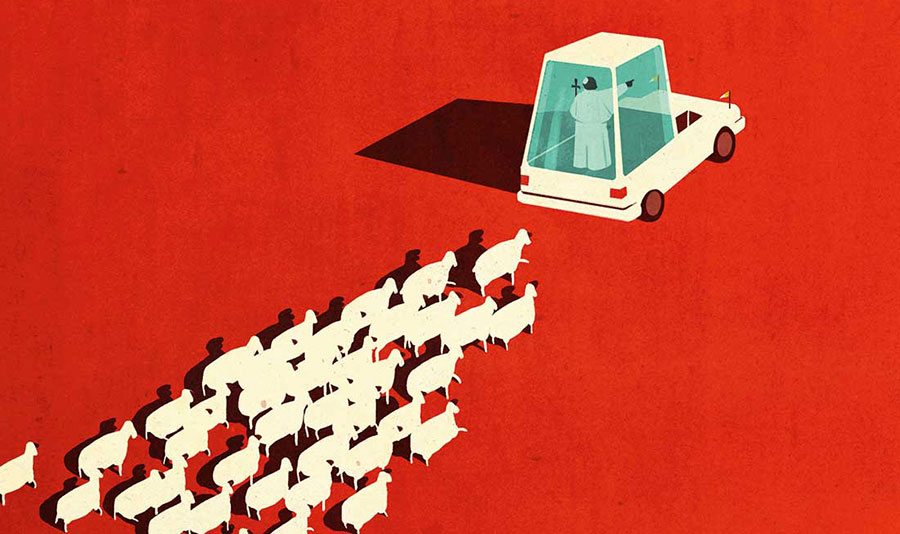
In a world beaten down by war, fear and ideological polarizations, there suddenly appears a new player: Pope Francis. One can hear the gigantic, squeaky wheels of Catholicism slowly turning in new directions. Where is the Holy Spirit taking us? A conclusion to be drawn is that the papacy, despite relentless criticism, enjoys a remarkable amount of respect. There’s capital and cachet there, and even a skeptical world seeks untapped potential for good from Rome. I suppose it’s all about hope. Everyone hopes for “life in abundance,” as Jesus calls it in the Gospels.
On the world scene, one is hard pressed to find a more ancient, resilient institution than the papacy. Can it be a source of vision and harmony? Or will it, in the view of many critics, keep hunkering down in the direction of “culture wars” and religious fundamentalism? Can the Catholic Church under Pope Francis bring forth, as Jesus suggests in the Gospel, “things old and new, … putting new wine in new wineskins (Mark 2:22)”?
These, then, are my hopes for this papacy based on preliminary study and first impressions of the first Latin American and Jesuit Pope:
First, he will change the conversation between Catholicism and the world by stressing that dialogue and openness to change (conversion) are central features of Catholicism, and essential aspects of fidelity to Jesus’ teachings and Catholic identity. He will hold to basic teachings of orthodoxy, and yet his gestures, his demeanor, his manner constitute a “medium.” Thus, Pope Francis will promote a communications revolution that impacts how people hear and receive Christian teachings. He will propose keeping the conversation going and listen attentively to those who disagree. He will seek harmony (not just toleration) based on mutual respect and a willingness to change, to go beyond oneself rather than be “self-referential.” He will insist on a creative fidelity to the Christian message, not a slavish imitation of it.
More than anything else, the new Pope will model the way of Christ, who sought to relate to all, especially the poor and marginal, in a manner that made love of others, love of those with whom one disagrees and love of enemies the bottom line. Jesus obviously did not put formulations of truth first; rather, he claimed to be “the way, the truth, and the life.” So truth is found in divine and human encounters, right “relationships with God and others,” and not primarily in assent to cold propositions. The new Pope recalls us to the admonition of St. Francis: “Preach the Gospel and, if you have to, use words.” Pope Francis’ Jesuit background, moreover, echoes a similar conviction, one found in St. Ignatius Loyola’s Spiritual Exercises: “Love shows itself more in deeds than in words.”
Second, Pope Francis will contribute to the creation of a more interconnected world in which human solidarity is the dominant perspective. As a spiritual guide who has worked for decades with ordinary people, Pope Francis knows the misery and grandeur of humanity broken by sin and injustice. He will propose three important orientations of the Church in Latin America that he knows firsthand: a) the option for the poor; b) popular Catholicism with its rich expressions of piety and prayer as a powerful conduit of faith; and c) small faith-sharing communities as fundamental features of the Church’s life and mission.
Third, U.S. Latinos relate deeply with the Pope’s message and manner, and they will continue to bring distinctive leadership contributions to the Church and society. The election of Pope Francis reveals a tectonic shift in global Christianity as well as in society: Those on the margin move toward the center. That shift conjures hope and receptivity for what the Global South has to offer.
As a young man, this Argentine Pope loved to tango. Is that trait emblematic of his affectivity and deep sense of human dignity? May we not take it as an invitation for us all to dance with him to the seductive beat of Jesus’ Spirit? Suddenly and unexpectedly, LMU’s mission and vision, the service of faith and the promotion of justice, gains a remarkable ally and much synergy and hope in our new Latino, Jesuit Pope, whose lead we proudly follow as a Catholic and Jesuit university in one of the most Latino regions of the nation.
